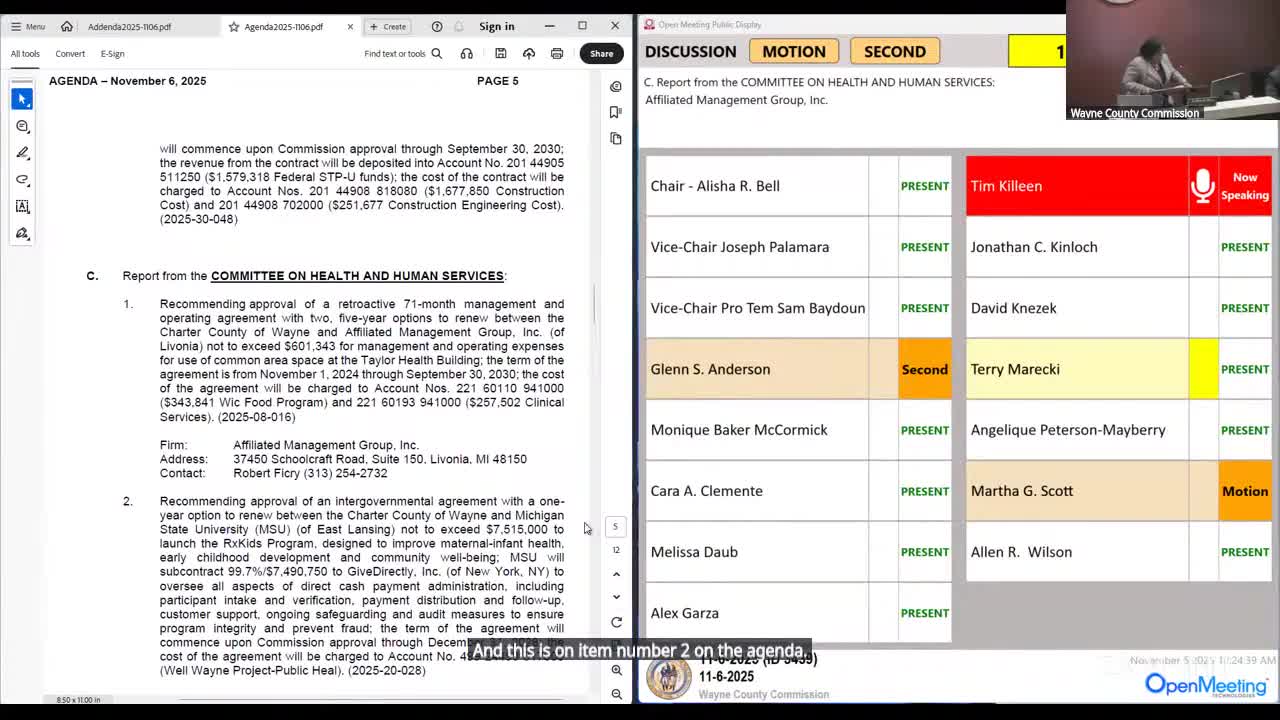Wayne County approves RxKids cash pilot to give expectant mothers direct payments in six cities
Get AI-powered insights, summaries, and transcripts
Subscribe
Summary
Wayne County commissioners approved a contribution to RxKids, a pilot that pays expectant mothers a $1,500 prenatal payment and $500 per month for six months after birth in six high‑need cities.
Wayne County commissioners approved a county contribution to RxKids, a time‑limited direct‑cash program for expectant mothers aimed at reducing infant poverty and supporting maternal and early‑childhood health.
Kanielle Johnson, interim director of the Wayne County Department of Health, Human, and Veterans Services, told the commission RxKids provides a one‑time prenatal payment of $1,500 once a physician’s note confirms pregnancy at 16 weeks, followed by $500 per month for the baby’s first six months. "These funds are unconditional," Johnson said, adding they can be used for food, diapers, housing, transportation or caregiving support.
The program will launch in six Wayne County cities identified as having the highest social‑vulnerability scores: River Rouge, Inkster, Highland Park, Hamtramck, Melvindale and Dearborn. Johnson said the county’s contribution to the pilot is a not‑to‑exceed $7,500,000; she told commissioners state funds (including TANF) and local/philanthropic matches are expected to expand the program’s reach.
Dr. Luke Schaeffer, a co‑founder of the RxKids initiative, said residency is verified at one point (pregnancy or birth) and that applicants in temporary housing or shelters would be eligible. "If she were to verify residency, she can sign up for the program. She would be eligible for the duration of the program," he told the commission.
Commissioners pressed officials on targeting and fairness. Commissioner Monique Baker‑McCormick said her concern was that a universal design might allow residents with higher incomes to receive limited funds, diluting the benefit for the most vulnerable. Johnson said the pilot is place‑based and that communities were selected using the Centers for Disease Control’s social‑vulnerability concept (socioeconomic indicators, household composition and disability, minority status and language, housing and transportation) so funds go to neighborhoods with disproportionate need. She added that the pilot also considered Medicaid births per community to estimate allocations.
Officials described local matching arrangements. Johnson said Dearborn raised roughly $2 million and that Wayne County’s contribution to Dearborn’s rollout would be $629,000. She said the current state budget provides significant TANF and other funds for the initiative and that the county match would help trigger those state dollars. Commissioners were told the $7.5 million county authorization is not expected to exhaust state support; Johnson said she anticipated additional state dollars to support expansion if the pilot succeeds.
During the roll call on the health committee report, one commissioner recorded a "no" on the RxKids item; the meeting record does not include a complete roll‑call tally in the public transcript. Director Johnson and Dr. Schaeffer said the county will provide updates and metrics as the program rolls out and will share enrollment, evaluation and outcome information with the commission.
Why it matters: Health‑and‑economic research cited by presenters indicates that direct, unconditional cash transfers in pregnancy and early infancy can improve short‑ and long‑term health and developmental outcomes and generate local economic activity. Supporters argued the pilot targets neighborhoods with concentrated need; some commissioners requested clearer mechanisms to ensure those with the greatest financial need access funds first.
Next steps: Commissioners approved the items in the Health and Human Services report that included the RxKids authorization. Staff said a kickoff is planned immediately and that enrollment could begin within days depending on final administrative steps. The county will provide periodic updates on enrollment and outcomes.
